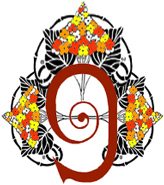|

In the beginning, oils and scents (a.k.a. aromatherapy) were used to anoint kings, queens and holy men. In fact, priests
may have been the first to market them! Today, the healing properties of essential oils are simply a given. We find them everywhere
from yoga studios to supermarkets. So how do we get the most out of this enchanting gift from nature?
Aromatherapy, which is commonly associated with alternative medicine, is the therapeutic use of volatile liquid plant
materials, known as essential oils. Inhaling them can affect your mood or health. The psychological effects of aroma can be
rapid, and may be relaxing or stimulating.
Essential oils may also be applied topically to the skin and may elicit a rapid physiological effect (i.e., cooling or
warming). While some aromatherapists do not consider topical or ingested essential oils as part of aromatherapy, others contend
that the topical, ingested, and inhaled uses of essential oils is aromatherapy.
There are no scents specifically associated with the seasons, though certain healing oils can be linked to the typical
health issues that arise throughout the year. We can also look to Traditional Chinese Medicine (TCM) to figure out which organs
tend to be out of balance during any given season.
Summer daze
The best approach for keeping cool in the summer is a combination of essential oils and hydrolats, or distilled plant
waters that can be sprayed on the face and body, says aromatherapist Valerie Bennis. Wonderfully cooling hydrolats include
neroli, rose otto and lavender. One spray is refreshing. Palmarosa, sandalwood, vetiver, neroli and cypress are more cooling
scents.
Autumn sniffles
According to TCM, autumn is the time of the lungs and large intestine. Some essential oils that are therapeutic for the
lungs include rosemary, eucalyptus, myrrh, frankincense and cedarwood, says aromatherapist Jessica Kramer. Inhale once or
twice for a sense of inner peace.
Essential oils that are therapeutic for the large intestine include black pepper, cardamom, ginger and orange. A few drops
of each in an ounce of unscented cream rubbed on the chest can be a warming treat. Oils such as thyme and oregano may also
ward off pesky colds. But keep in mind that thyme and oregano may irritate the skin if not sufficiently diluted.
Winter blues
There is a selection of oils with antidepressant qualities, but for the "winter blues" Kramer recommends citrus
oils such as grapefruit, bergamot, lemon and lime. "They have antidepressant therapeutic properties, but people generally
take one sniff and feel light, uplifted and refreshed."
The winter cold and flu season may also be addressed with pine, eucalyptus and ravintsara (cinamomum camphora). They can
reduce congestion, ease aches and pains, they are antibacterial and antiviral, and may be used via inhalation in a steam room
or a room diffuser, adds Bennis. Use warming oil blends - try black pepper and ginger - during the coldest months of the winter.
Spring has sprung
Effective oils for the spring months are those which support the liver and gallbladder, as spring is the season when these
organs tend to be out of balance. They include lemon, basil, geranium and orange, says Kramer. In the spring, choose floral
oils such as lavender and rose to celebrate the blossoming flowers. These oils nourish the heart, and helps soothe difficult
transitions.
Make refreshing sprays with spring oils. A few drops in a spray bottle of water can offer some cooling relief on warm
days. Bring the mist to the gym or on a hike.
Finally, experts warn that it is extremely important that consumers know the quality of the oils they are purchasing.
Many essential oils on the market are adulterated, meaning they contain both 100% pure essential oil as well as synthetic
adulterates. These synthetic adulterates not only detract from the therapeutic qualities of the oil, but can also add stress
to the body. To insure high quality and 100% natural oils, buyers should ask if each batch of oil isGC/MS (gas chromatography/mass
spectrometry) tested.
Year round healing oils:
Yarrow is used to reduce joint inflammation and relieve cold and influenza symptoms.
Basil is used in perfumery for its clear, sweet and mildly spicy aroma. In aromatherapy, it is used for sharpening concentration,
for its uplifting effect on depression, and to relieve headaches and migraines. Basil oil should be avoided during pregnancy.
Bergamot is one of the most popular oils in perfumery. It is an excellent insect repellent and may be helpful for both
the urinary tract and for the digestive tract. It is useful for skin conditions linked to stress, such as cold sores and chicken
pox, especially when combined with eucalyptus oil.
Black pepper has a sharp and spicy aroma. Common uses include stimulating the circulation and alleving muscular aches
and pains. Skin application is useful for bruises, since it stimulates the circulation.
Clove is a topical analgesic, especially useful in dentistry. It is also used as an antiseptic and antispasmodic.
Related Articles
De-Stress in 30 Seconds
Winter aromatherapy to lift your spirits
Zing Into Spring!
Channel the magic of the vernal equinox
Summer Solstice
The first day of Summer is upon us!
Bring Fall Into Your Home
Use the energy of the season to create changes for yourself!
Shorter Days, Longer Nights
Evening advantages
by Maryam Henein
|

